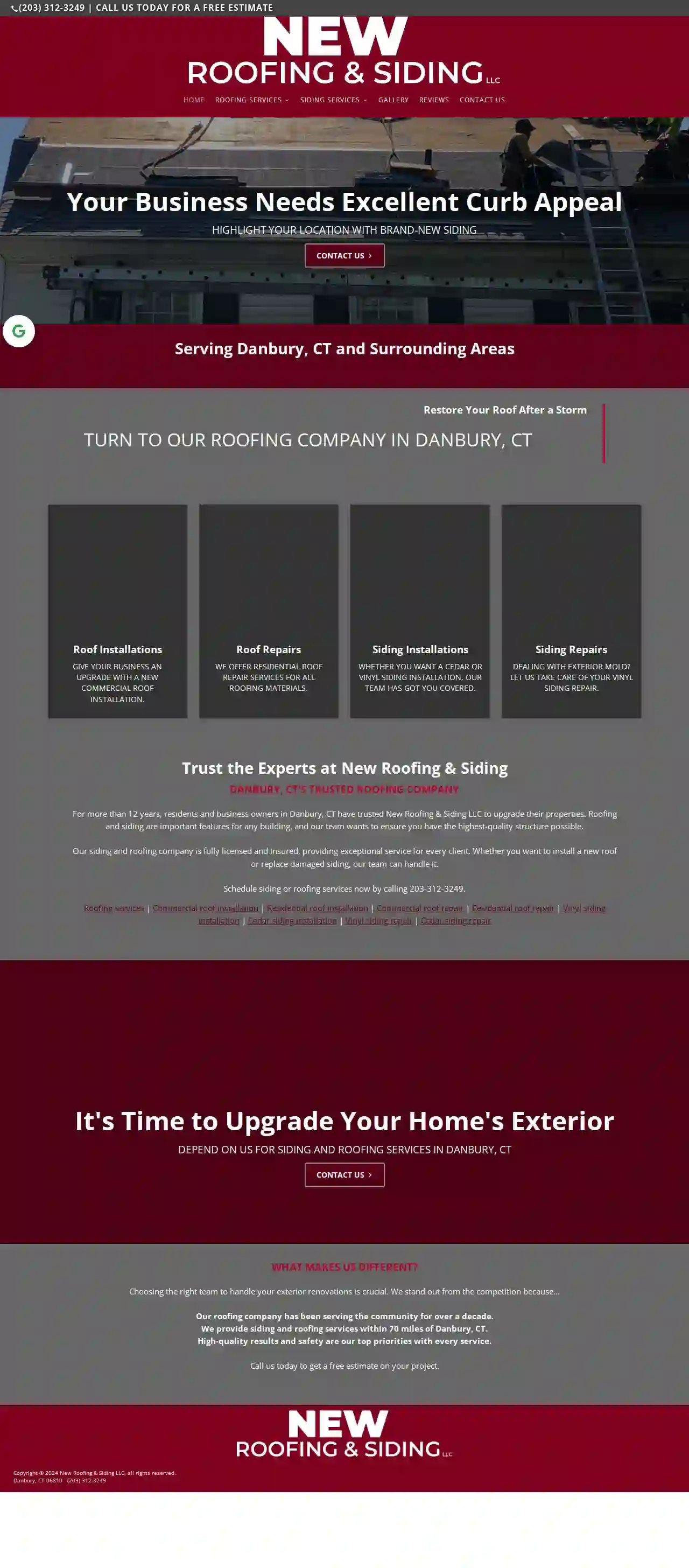Roofing Companies Wallingford
Top Roofing Companies in Wallingford
Get up to 3 Roofers quotes for your project today! Compare profiles, reviews, accreditations, portfolio, etc... and choose the best service.

All Roof USA LLC
55 reviews11111 Westheimer Rd, Suite 100, 11111 Westheimer Rd Suite 100, Houston, 77084, USAll Roof USA is a full-service roofing company serving the greater Houston area. We specialize in residential and commercial roofing, offering a wide range of services including new roof installations, roof repairs, roof replacements, and roof maintenance. Our team of experienced and certified roofers is dedicated to providing high-quality workmanship and exceptional customer service. We use only the best materials and techniques to ensure that your roof is durable, reliable, and aesthetically pleasing. Whether you need a minor repair or a complete roof overhaul, All Roof USA is the trusted partner for all your roofing needs. At All Roof USA, we understand that your roof is one of the most important investments you make in your home or business. That's why we are committed to providing you with the highest level of quality, service, and value. We offer free estimates, competitive pricing, and flexible financing options to make your roofing project as stress-free as possible. Contact us today to schedule a consultation and let us help you protect your investment.
- Services
- Why Us?
Get Quote
Reliable Roofers & Company
526 reviews72 Grays Bridge Rd Unit H-1, Brookfield, 06804, USWelcome to Easy Roofing – Formerly Reliable Roofers & Company! New Name, Same Dedication to Excellence. Easy Roofing is a local roofing company dedicated to quality service and customer satisfaction. No matter what kind of roofing service you require, we are the company to help you with it. With years of experience behind us, we understand what customers look for in a professional contractor and know how to provide those results. Whether your roofing is in rough shape, you need a simple repair, or you simply have a few roofing inquiries, there is no better team to meet than us!
- Services
- Why Us?
- Accreditations
- Our Team
- Testimonials
- Gallery
Get Quote
Atlantic Roofing & Restoration Company
Hartford, USWelcome to Atlantic Roofing, a family-run business that provides Connecticut residents and businesses with experience and quality that is second to none. Our commitment to provide and install only the very best home improvement products starts at the top with CertainTeed roofing, the #1 rated manufacturer of the highest quality roofing materials. We take great pride in the partnership we've created with each and every customer, and we appreciate the opportunity to earn your business. Our beliefs and commitment to excellence is a part of the entire process, from the first phone call to the completion of your project. We were founded on the principles of hard work, exceptional products, and commitment to each and every customer. Best Roof for the Worst Weather, Atlantic Roofing and Restoration installs only the highest quality shingles supported by WinterGuard, a special waterproofing barrier that helps prevent leaks caused by ice dams, and wind-driven rains.
- Services
- Why Us?
- Testimonials
- Gallery
Get Quote
Rhoades & Company Siding Installation
5113 reviews793 Burnham St, USRhoades & Company Siding Installation is a family owned business in CT with over 20 years of experience in vinyl siding installation. Services include siding installation, window and garage door installation, gutter installation and siding repairs on a wide range of residential and commercial properties across Connecticut. Our goal is to work with the highest quality materials, which allows our installers to produce some of the finest craftsmanship in Connecticut. At Rhoades & Company, we are dedicated to providing exceptional personalized customer service, offering high quality products and ensuring that every project is executed to the highest standards.
- Services
- Why Us?
- Accreditations
- Our Team
- Testimonials
- Gallery
Get Quote
Alpha Commercial Roofing - East Hartford, Connecticut
52 reviewsHartford, USAccount Suspended This Account has been suspended. Contact your hosting provider for more information.
- Services
- Why Us?
- Gallery
Get Quote
Roofing Contractor of Manchester
59 reviews17 Jackson St, Manchester, 06040, USRoofing Contractor of Manchester is a locally owned and operated roofing company serving Manchester, CT and surrounding areas. We are fully licensed, certified, and insured, providing top-quality residential and commercial roofing services. Our team of experienced roofers is dedicated to delivering exceptional customer service and ensuring your complete satisfaction. We offer a wide range Roofing Contractor of Manchester We take pride in all roofing projects here at Roofing Contractor of Manchester. Our crew strives to deliver only the highest quality of roofing services to all Manchester, CT, residents, and we haven’t failed a single client since our company’s inception. From roof installation to conventional roof maintenance, we do our best to ensure all clients get the quality roofing service they deserve. Our Mission We prioritize all clients for residential or commercial roofing projects in Manchester, CT. Our mission is to provide our customers with top-quality customized roofing solutions to solve their unique needs quickly and efficiently. Moreover, we ensure that we can help them make better-educated decisions by guiding them in picking the best materials and services for their roofing needs, especially when on a restricted budget. We recognize all our residential or commercial clients have unique needs. So, we go above and beyond to meet their specific standards and criteria. We do so to ensure that each is happy and satisfied after every roofing project. Our commitment to excellence and dedication to helping our clients achieve the roof they want and can protect them motivates us to continue our business. Roofing Contractor of Manchester:The Most Credible Roofing Company in Manchester, CT Innovation is among the main driving forces of success. That’s why our team of roofing experts in Manchester, CT possesses the initiative of pressing forward with their craft while adapting and keeping up with the ever-changing roofing industry. We keep an open mind in ensuring we adapt to all changes to offer top-quality services to all customers.We’ve been dabbling in the roofing sector for years. And we’ve seen and experienced how the industry has changed due to the latest technological advancements. As a result, we do our best to stay up-to-date with the newest techniques to ensure we can keep up or surpass the competition. We also ensure that our clients receive the highest quality roofing services that fit their unique preferences and criteria in this modern age.At Roofing Contractor of Manchester, each client is our boss, and we will go above and beyond to give them the best quality service at competitive prices! Ready to Get Started? If you’re looking for a trusted roofing company you can find it here at Roofing Contractor of Manchester!When it comes to roofing services, no one does it better than Roofing Contractor of Manchester.Our primary focus is on commercial and residential roofing. Still, we do everything from roof maintenance, repair, replacement, and new roof installation!No matter how intricate your roof problem may be, you can count on our team of licensed roofers to provide superior roofing services. We have a wide variety of roofing types, colors, and materials so that you can find the perfect fit for your home.Do you want to see what we can do? Check out the pictures below to see some of our work for prior satisfied customers! Roofing Contractor of Manchester is a well-regarded business in the Manchester, CT, roofing industry. We are fully licensed, certified, and insured so that you can trust our proficiency. Whether a residential or commercial building, we promise to provide the superior roofing service it requires.Make an appointment for a no-cost assessment right away! CALL: 860-891-2597
- Services
- Why Us?
- Accreditations
- Our Team
- Testimonials
- Gallery
Get Quote
Exeter Roofing Corporation
4.516 reviews16A Indian River Rd., Epping, 03042, USWith a combined experience of over 70 years, Exeter Roofing is a trusted name in the roofing industry. We take pride in our extensive knowledge and expertise in all types of roofing, ensuring that we provide our clients with top-notch solutions that stand the test of time. At Exeter Roofing, our mission is to provide you with the highest level of craftsmanship ensuring the longevity and durability of your roof. We take the time to understand your unique needs and tailor our services accordingly. Learn More
- Services
- Why Us?
- Gallery
Get Quote
ModernWayRoofing & Siding
597 reviewsWaterbury, USAt Modern Way Roofing, we believe that a strong and reliable roof is the foundation of a safe and comfortable home. We are a dedicated team of roofing professionals with a passion for delivering high-quality roofing solutions that protect your most valuable asset – your home. Our mission is simple: to ensure the safety and comfort of your home by delivering top-tier roofing services. We strive to: Provide expert roofing solutions tailored to your needs. Deliver unmatched quality in every project we undertake. Maintain transparency and open communication throughout the process. Prioritize your satisfaction and peace of mind.
- Services
- Why Us?
- Testimonials
- Gallery
Get Quote
Nor'easter Roofing
571 reviews1 Providence Lane, Whitinsville, 01588, USNor'easter Roofing delivers professional service and first quality products. For over 38 years we have helped homeowners add value to their most important investment. The roof is the most important component of your home. A leaky, worn-out roof risks all that is under it. Let our professional crew help you to protect your home. Contact us today! Deal directly with the Owner of Nor’easter, Rob Chaille; Not an Outside Salesman! Nor’easter Roofing now has 2 Locations: Meredith, NH and Whitinsville, MA. We can provide Premier Roofing Services to Both of these Areas!
- Services
- Why Us?
- Our Team
- Testimonials
- Gallery
Get Quote
New Roofing & Siding
56 reviewsDanbury, CT, 18 Sheridan Street, 06810, USNew Roofing & Siding LLC is a trusted roofing company in Danbury, CT, serving the surrounding area for over 12 years. We specialize in roofing and siding work, including installations and repairs. Our team is fully licensed and insured, providing exceptional service for every client. We offer a range of services, including commercial and residential roof installations, repairs, and siding installations and repairs. Contact us today to schedule a service and get a free estimate on your project.
- Services
- Why Us?
- Our Team
- Testimonials
- Gallery
Get Quote
Over 17,196+ Roofing Contractors onboarded
Our roofing pros operate in Wallingford and beyond!
Roofyng.com has curated and vetted Top Roofing Businesses arround Wallingford. Find a top & trustworthy contractor today.
Frequently Asked Questions About Roofing Companies
- Experience: 'How long have you been in business, and what experience do you have with my type of roof?'
- Licensing and insurance: 'Are you licensed and insured, and can I see proof of coverage?'
- Warranties: 'What warranties do you offer on your work and the materials used?'
- References: 'Can you provide references from past clients?'
- Project Timeline: 'What is the estimated timeline for completing the project?'
- Payment Terms: 'What are your payment terms, and do you require a deposit?'
- Communication: 'How will you keep me updated on the project's progress?'
- Cleanup: 'What steps will you take to protect my property during the project and ensure proper cleanup afterward?'
- Listed Buildings: Buildings with historical or architectural significance.
- Conservation Areas: Areas with special architectural or historical character.
- Changes to Roof Design: If you're making significant alterations to the roof's design, such as adding a dormer window or changing the pitch.
- Style: Consider your home's architectural style and choose a roofing material that complements it.
- Climate: Factor in your local climate conditions. Some materials perform better in extreme heat, cold, or high winds than others.
- Budget: Roofing materials have a wide range of costs. Determine your budget and choose materials that fit your financial constraints.
- Durability and Lifespan: Assess the expected lifespan and durability of different materials.
- Energy Efficiency: Choose materials with good insulation and reflectivity properties to improve your home's energy efficiency.
What questions should I ask a roofing contractor?
Do I need planning permission to replace my roof in the USA?
What is a roof valley, and why is it important?
How do I choose the right roofing materials for my home?
What questions should I ask a roofing contractor?
- Experience: 'How long have you been in business, and what experience do you have with my type of roof?'
- Licensing and insurance: 'Are you licensed and insured, and can I see proof of coverage?'
- Warranties: 'What warranties do you offer on your work and the materials used?'
- References: 'Can you provide references from past clients?'
- Project Timeline: 'What is the estimated timeline for completing the project?'
- Payment Terms: 'What are your payment terms, and do you require a deposit?'
- Communication: 'How will you keep me updated on the project's progress?'
- Cleanup: 'What steps will you take to protect my property during the project and ensure proper cleanup afterward?'
Do I need planning permission to replace my roof in the USA?
- Listed Buildings: Buildings with historical or architectural significance.
- Conservation Areas: Areas with special architectural or historical character.
- Changes to Roof Design: If you're making significant alterations to the roof's design, such as adding a dormer window or changing the pitch.
What is a roof valley, and why is it important?
How do I choose the right roofing materials for my home?
- Style: Consider your home's architectural style and choose a roofing material that complements it.
- Climate: Factor in your local climate conditions. Some materials perform better in extreme heat, cold, or high winds than others.
- Budget: Roofing materials have a wide range of costs. Determine your budget and choose materials that fit your financial constraints.
- Durability and Lifespan: Assess the expected lifespan and durability of different materials.
- Energy Efficiency: Choose materials with good insulation and reflectivity properties to improve your home's energy efficiency.